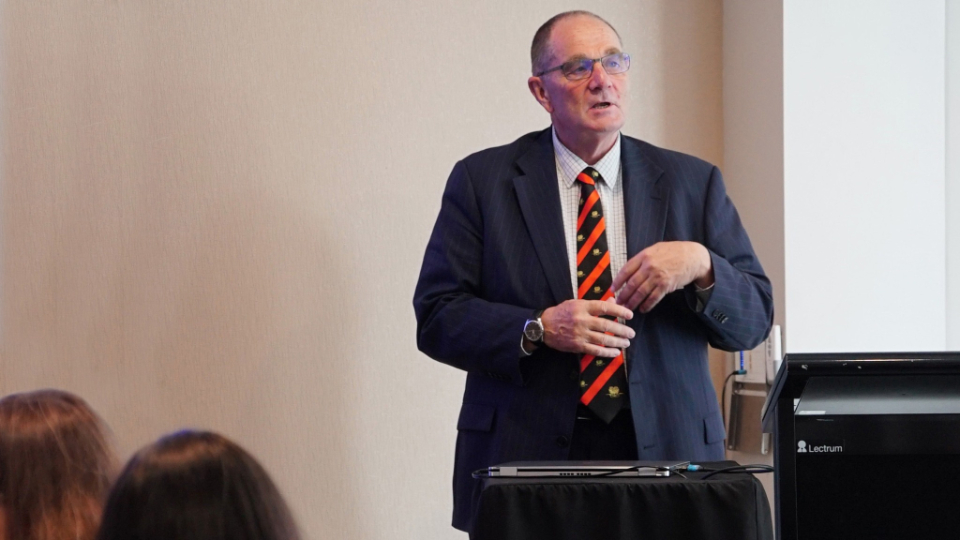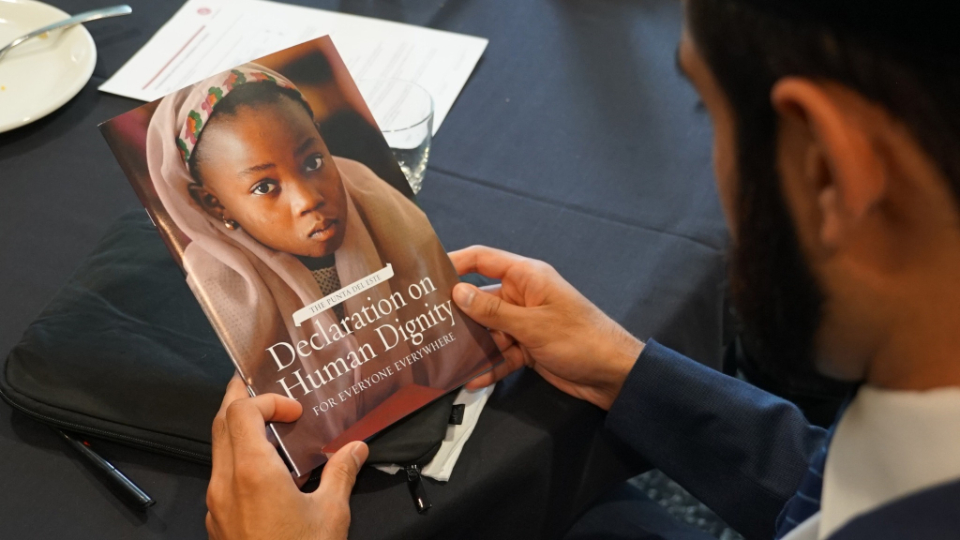Elder Kazuhiko Yamashita, Second Counsellor in the Pacific Area Presidency of The Church of Jesus Christ of Latter-day Saints, and Sister Tazuko Yamashita, met with faith, academic, government and community leaders in Wellington, New Zealand on Wednesday, 25 November.
- Elder-and-Sister-Yamashita-with-Sheikh-Amir.JPG
- Elder Kazuhiko and Sister Tazuko Yamashita with guests at the Law and Religion lunch held in Wellington, New Zealand on 25 November 2020.
- Elder-and-Sister-Yamashita-meet-Professor-Paul-Morris,-past-ILRS-delegate.JPG
- Elder-and-Sister-Yamashita-meet-Mustenser-Qamar.JPG
- Her Excellency Ms. Vuyiswa Tulelo converses with Elder Kazuhiko Yamashita and Sister Tazuko Yamashita at a Law and Religion lunch held in Wellington, New Zealand.
- Hon Chester Borrows, International Law and Religion Symposium, 2-4 October 2016. Provo, Utah, USA.
- Sheikh-Mohammed-Amir.JPG
- International Law and Religion Symposium 2019.
- Members of the Wellington Interfaith Council, (left to right) Tania Torea, Vanisa Dhiru, and Deputy Chair Mere Fiore at a luncheon to discuss religious freedom. November 2020.
- Elder Kazukiko Yamashita addresses the group at the Law and Religion Lunch.
- Jenny-Dawson-and-Tania-Torea.JPG
- Elder-Yamashita-speaking.JPG
| Temple Square is always beautiful in the springtime. Gardeners work to prepare the ground for General Conference. © 2012 Intellectual Reserve, Inc. All rights reserved. | 1 / 2 |
The occasion was a luncheon to discuss religious freedom within the New Zealand context.
In particular, speakers focused on ways individuals and groups can take responsibility to build unity irrespective of differences in religious and cultural practices.
Guests included past attendees at Brigham Young University’s annual International Law and Religion Symposium (ILRS), Professor Paul Morris, Victoria University of Wellington; Sheikh Mohammad Amir, Chairman of the Religious Advisory Board of the Federation of Islamic Associations of New Zealand (FIANZ); and Chester Borrows, Chair of Te Uepū - Safer and Effective Justice Advisory.
In his remarks, Elder Yamashita said, “We come together in a spirit of respect for diversity and personal choice, but also with a desire to find common ground.”
Sharing from his Japanese heritage, Elder Yamashita explained, “About two thirds of Japanese identify as ‘without religion,’ yet this does not signify irreligion.”
“Most Japanese participate in rituals and customs that derive from several religious traditions,” including Shinto, Buddhist, and Samurai practices, and “freedom of religion is guaranteed to all.”
Quoting from Viva Bartkus, Associate Professor of Management at the University of Notre Dame ─ who spoke at this year’s International Law and Religion Symposium last month, which was an online event due to COVID-19 ─ Elder Yamashita said, “Solutions to difficult problems lie in the common ground we imagine and then create together.”
Elder Yamashita asked, “What are the common values and common ground amongst us?”
He suggested: “Family, love, gratitude, friendship, kindness, service, hope, prayer, respect, health, faith, and humanity.”
Elder Yamashita shared President Russell M. Nelson’s November 2020 invitation to “give thanks,” and emphasised that “the healing power of gratitude was a message for everyone.”

Chester Borrows shares his ILRS experiences at Law and Religion Lunch held in Wellington, New Zealand.
Chester Borrows speaks about his experience as a New Zealand delegate at the 2017 International Law and Religion Symposium held in Provo, Utah.© 2020 by Intellectual Reserve, Inc. All rights reserved.Reflecting on his experience as an ILRS delegate in 2017, former Member of New Zealand Parliament, Chester Borrows, noted, “How welcoming everyone was, and how diverse the audience was, and the participants.”
Mr Borrows continued: “It is such an important crystallisation of my faith and the out-work of my faith that I’ve been doing now for over 45 years in justice, particularly the criminal justice sector, because of the warmth of feeling of people who all felt the same way about the same thing and driven by their faiths, whatever faith that might be.”
2019 ILRS delegate, Sheikh Mohammad Amir, Chairman of the Religious Advisory Board of the Federation of Islamic Associations of New Zealand (FIANZ), addressed the group, encouraging people of faith to “…follow [their] religious values.”
“The basic religious teaching,” he said, “is a promotion of the freedom and tolerance and respect to community."
Her Excellency, Ms Vuyiswa Tulelo, High Commissioner of the Republic of South Africa, said, “We need to take a conscious decision as people to relate to each other on the basis of humanity before we bring in our religious views or legal expertise. Once we do that, whatever law we make will be in pursuance of a just humanity, and whatever religion we profess will focus on loving each other and serving each other.”
Gordon Tanner, Pacific Area Legal Counsel for The Church of Jesus Christ of Latter-day Saints, informed guests of a worldwide initiative, supported by Brigham Young University and other organisations, titled “Human Dignity for Everyone, Everywhere.”
